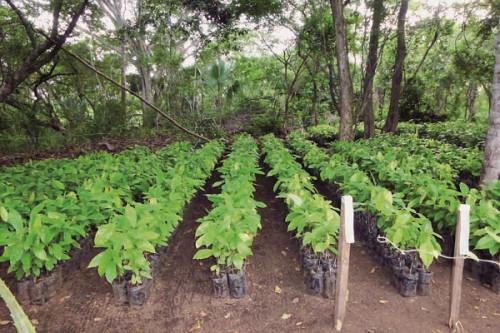Cameroon loses 40 to 50% of its cocoa seedlings in nursery plants every year because of climate change due to which dry seasons are increasingly longer.
This was revealed by Jean Claude Akouafane, director-general of the Cocoa Development Company (SODECAO), during the inauguration, on April 13, 2021, of SODECAO’s watering device in Ebolowa, in the South.
The executive explained that thanks to the watering device, its nursery plants located in Ebolowa would increase its production to 200,000 seedlings, against 125,000 currently.
Meanwhile, recently, SODECAO indicated that it was planning to distribute 4 million high-yield cocoa seedlings to renew ageing farms and expand some of the existing ones. The end goal of this campaign is to boost national production.
According to actors in the cocoa sector, the age of the plantations and the producers, the poor quality of plant materials as well as difficult access to seedlings are the problems hindering the increase in national cocoa production.
Cameroon Partners Tree Global To Create Cameroon Seedling Company
The government of Cameroon has signed a Memorandum of Understanding (MoU) with a Switzerland-based organization known as Tree Global for the creation of Cameroon Seedling Company expected to transform and modernize agriculture as well as boost the country’s economy through wealth and job creation.
The MoU was signed last April 17, 2019, in the Conference Room of the Ministry of the Economy, Planning and Regional Development by Minister Alamine Ousmane Mey and the Chief Executive Officer of Tree Global, Gregory Hess, to launch feasibility studies for the creation of a high-tech industrial tree and distribution system for high-performance tree seedlings in Cameroon.
Speaking at the occasion, Mr Gregory Hess promised that once the company is created, “We will be able to restore at least 60,000 hectares of degraded agricultural and forestry lands every year; increase farm productivity by 2-4 times in crops such as cocoa, coffee and cashew; triple farmer incomes and diversify sources of farmers’ income.
Create not less than 3,000 rural jobs in the tree nursery supply chain; strengthen community resilience to climate change; attract millions of foreign investments in ecotourism; generate more revenue into government coffers etc.”
Justifying that their move was triggered by the fact that Cameroon, like many other African countries South of the Sahara, faces serious challenges in agro-forestry and environmental sustainability; thereby diminishing productivity in tree crop production like cocoa, he explained that, “the agreement is aimed at breaking a vicious cycle where productivity per hectare is very low and has not changed in 100 years with low productivity farming expanding on the backs of farmer poverty and severe deforestation.
The pressure on the forest accelerates the impact of climate change which further reduces the productivity of soils.”
To the CEO, “the availability of high-quality tree seedlings is the single biggest driver of tree crop productivity, forest restoration and carbon sequestration as business as usual cannot meet these challenges unless through a concerted effort across ministries, public establishments and private sector operatives.
He explained that “The impact of High-Performance Tree Seedlings is transformational.
In cocoa in Ghana, for example, we have been able to increase survival rates on cocoa farms from 40% to greater than 90%; generate 50% gains in height and calliper at one year of age, and achieve first pod yields in 15-18 months.
He said Tree Global as “a company that builds state-of-the-art nursery facilities by applying advanced growing technologies to produce high-performance tree seedlings of all species to enable the trees consistently achieve their full genetic potential, will be able to produce at least 50 million high-performance tree seedlings per year; create and support 500 locally-owned rural businesses, called seedling distribution centres.”
The MINEPAT boss, Alamine Ousmane Mey who was asked by the Minister of Agriculture and Rural Development and the Minister Delegate to the Minister of Economy, Paul Tasong saluted the initiative and described it as a substantial gain for President Biya’s drive to transform Cameroon’s agric sector by making it a base for industrialization in the country’s strive for emergence by 2035.
- Major Ghana Cocoa Region 81% Infected with Bean Disease - July 22, 2024
- Ghana to Delay More Cocoa Deliveries as Supply Crisis Worsens - June 12, 2024
- Cocoa Production Helping Mitigate Climate Change Impact - June 10, 2024
